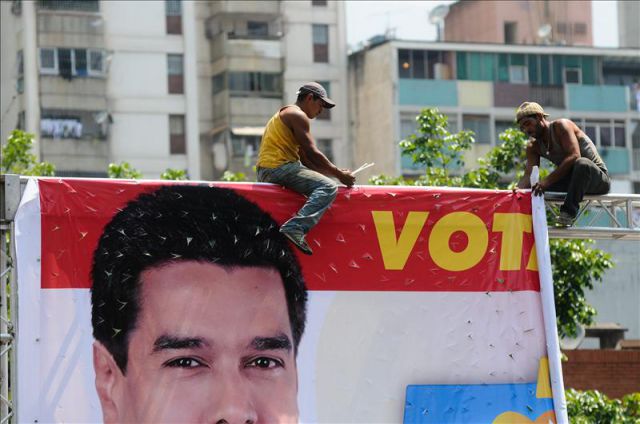In a new opacity action, the Supreme Tribunal of Justice (T.S.J.) declares inadmissible an interpretation recourse introduced by Transparencia Venezuela on 2 November 2015 in order to know what as anticipated electoral propaganda should be understood, according to the ambiguity and obscurity in articles 75, numeral 1 of the Organic Law of Electoral Processes, and 204, numeral 1 of the General Regulation of the Organic Law of Electoral Processes, according to ruling number 50, of 13 April 2016 of the Electoral Chamber in presentation of the Justice Indira Alfonzo Izaguirre.
The questions posed by Transparencia Venezuela in the interpretation recourse that the T.S.J. disallowed were:
- What should be understood as anticipated electoral propaganda?
- Should be understood as anticipated electoral propaganda all propaganda and publicity acts issued through any media and other means, such as billboards, posters, pamphlets, posters, decals and others, such as: rallies, public demonstrations, caravans, fairs, pilgrimages, loudspeakers, public meetings, assemblies, marches and similar expressions that tend to promote a government administration?
- Is anticipated electoral propaganda permitted when it is formally presented as an opinion program?
- Should an image, logo, billboard, pamphlet, poster, placard or decal, among others, containing the image of a recognized candidate without a textual call or invitation to vote be considered as electoral propaganda?
- Which is the competent body to initiate investigations?
- Which is the competent body to apply the corresponding sanctions?
- Which is the applicable procedure?
- Which is the sanction and which is the body responsible for executing and enforcing it?
On 2015, After sending more than 242 complaints of anticipated electoral propaganda to the Commission of Political Participation and Financing of the National Electoral Council (CNE), among which are 14 institutional Twitter accounts (@LAConviasa, Ministry of Water and Air Transport: @AcuaticoyAÉreo, the Bolivar Governorship: @PrensaGoBol, Venezolana de Cementos: @Venceremos VDC, Maiquetía Airport: @SVMI, the Venezuelan Embassy to Denmark: @EmbaVenDenmark, the NAtional Institute of Aquatic Spaces: @lnea_Venezuela, the Ministry of Sports: @Mindeporte, Mérida’s Trolleybus: @Trolebus_Merida, Táchira’s government: @GobiernoTachira, the National Radio of Venezuela: @RNVcontigo, Yaracuy’s Mercal: @MercalYaracuy, thr Newspaper Cuatro F Digital: @CuatroFDigital, and Misión Sucre: @SucreHaVuelto), we escalated the case with a hierarchical recourse before the electoral body, which so far has not been answered.
In parallel, an interpretation recourse was brought to the T.S.J., which the highest tribunal disallows for two reasons: it considers that a CNE’s hierarchical recourse has already been introduced, replacing one procedural means for another; and that the recourse was intended to clarify personal doubts of Transparencia Venezuela.
This TSJ’s decision maintains the doubt on what acts are considered as anticipated electoral propaganda, and how they will be sanctioned, allowing that those who exercise the power continue the abuse of public funds and institutions of the state in order to proselytize.
Extract of the Judgment
However, the petitioner states that “(…) the following doubts arise (…):
1. What should be understood as anticipated electoral propaganda?
2. Should be understood as anticipated electoral propaganda all propaganda and publicity acts issued through any media and other means, such as billboards, posters, pamphlets, posters, decals and others, such as: rallies, public demonstrations, caravans, fairs, pilgrimages, loudspeakers, public meetings, assemblies, marches and similar expressions that tend to promote a government administration?
3. Is anticipated electoral propaganda permitted when it is formally presented as an opinion program?
4. Should an image, logo, billboard, pamphlet, poster, placard or decal, among others, containing the image of a recognized candidate without a textual call or invitation to vote be considered as electoral propaganda?
5. Which is the competent body to initiate investigations?
6. Which is the competent body to apply the corresponding sanctions?
7. Which is the applicable procedure?
8. Which is the sanction and which is the body responsible for executing and enforcing it?
Inferring from the above that the appellant does not raise the opacity or reasonable doubt in the respective norms, but it seeks the issuance of judicial opinion to clarify personal doubts, with which concludes that the interpretation recourse in fact covers a consultative purpose, misrepresenting this procedural means for the accomplishment of an end different from its proper one, as it would be that this Chamber solves juridical consultations that legitimize singular actions of individuals. So it is declared (…)”.
